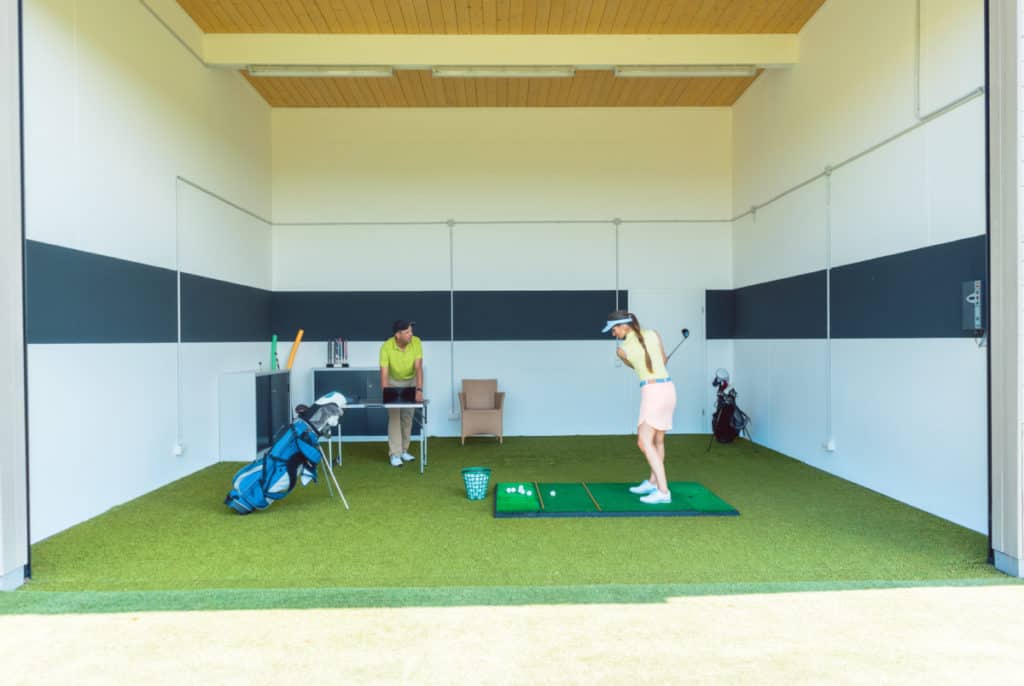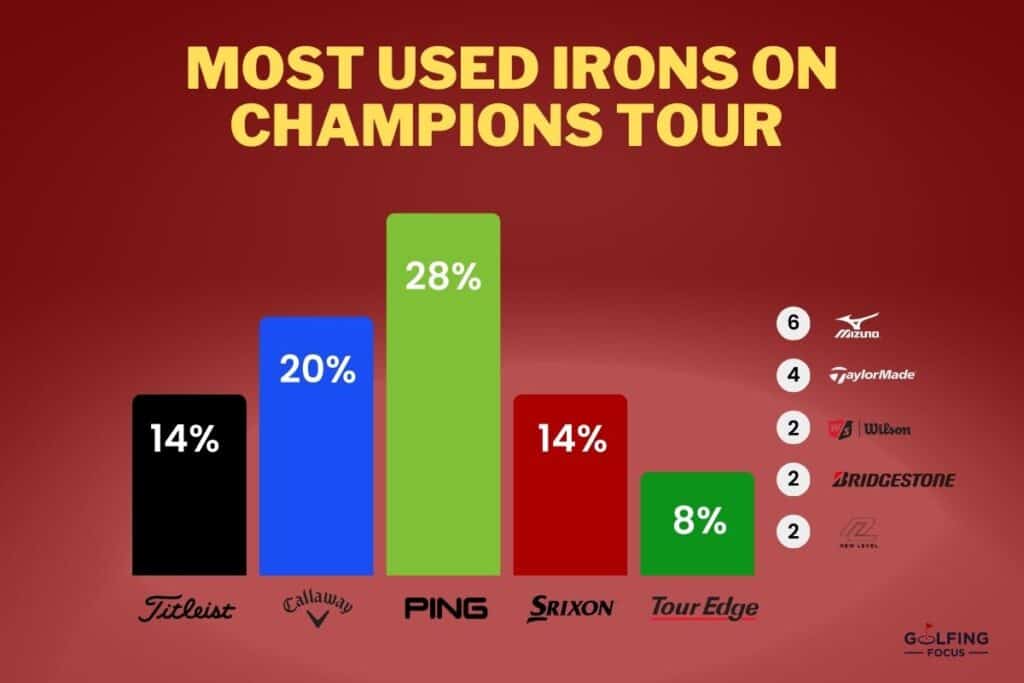How Many Golf Lessons Do You Need? 3 is the Magic Number

As soon as you take up the game of golf there will likely be lots of people telling you that you should take lessons.
But there are a number of questions that arise about golf lessons both as a beginner and throughout the time you play golf so we did some digging to see if there was a consensus view on how many golf lessons you need.
As a general rule beginners should take 3 to 5 golf lessons before playing on a course to help them learn the basics of the swing and rules. It is not compulsory to take lessons and only 15% of golfers seek professional instruction but they are generally viewed as one of the best ways to improve a player’s game.
Like your swing though how many golf lessons you need throughout your golfing career, and when you take them, is something personal to you.
The factors affecting how many lessons golfers take overall include cost, the player’s goals and the time available to implement changes and it is of course not a mandatory requirement for all players to take golf lessons.
Indeed there are many examples of players, including 2 time Masters winner Bubba Watson, who have never had a lesson and do just fine.
If you do decide to take lessons however you need to remember that how successful they are in improving your game will not principally be determined by the number of them that you take.
3 Key Factors Affecting the Number of Golf Lessons you Need
It is estimated that only 15% of golfers seek professional tuition despite it being generally viewed in the game that it is one of the best ways of improving a player’s game.
Why is this?
Well, there are 3 key factors that affect how many golf lessons people need and these are as follows:
1. How much change the golfer wants to make – there are two main types of golf lessons – construction and correction lessons. Construction lessons are most common for golfers new to the game and junior golfers and involve teaching all the fundamentals from scratch to create an entirely new swing. Correction lessons, by comparison, involve making changes to an existing swing. A ‘construction’ golf swing project is more difficult, will take more time and therefore most likely involve more lessons than a player looking for help to correct a fault with an existing swing.
2. Cost – Obvious I know, but the cost is clearly a factor, if not the major factor in determining how many golf lessons a player will take. A typical price for a standard golf lesson might range from $20-25, Euros or British Pounds, to more than a hundred. Extras such as video analysis or ‘playing’ lessons (i.e. where the teacher will play give you a lesson on the course) increase the standard price. Discounts are frequently available though if you sign up for a package of lessons – e.g. a series of six. Whatever a player’s goals are for golf lessons the number will obviously be affected by price and the cost limit of each individual.
3. The amount of time spent practising between lessons – no practice between golf lessons will most likely mean no progress. So if you spend next to no time practising what you have learned from the previous lesson before you take the next one you might as well have thrown the money you spent on the first one down the drain. A lack of practise between lessons gives you no opportunity to ingrain what you were told and so will inevitably lead to more lessons being required to reach your stated goal. How quickly an individual player can learn and implement the changes taught at a golf lesson obviously varies but the more time spent between lessons practising what you have learned the fewer lessons it is likely to take to achieve your goal. Given the time pressures of modern life therefore it is recommended not to bunch a series of lessons in a very short time span. Allow yourself time to work on the instruction from each lesson.

When it comes to lessons for kids it is advised that very little or no formal instruction is given to youngsters, particularly those under 5.
Golf instruction, particularly in a group setting, is fantastic for youngsters. But to be able to participate in lessons fully children need good listening skills and the ability to follow oral instructions.
Typically parents will, therefore, wait till their kids are of school age – around 5 to 6 years old – enter their children into golf lessons.
And how many lessons are too many for kids?
When the young player no longer wants to play it is probably a good sign it is too much.
“Never once did Jack Grout set foot on a practice tee at a tournament ….. I saw him maybe twice, three times a year. I think that’s why I became a pretty good golfer, because when I was having troubles on the golf course I knew how to correct myself.” (Jack Nicklaus, who had only one instructor, Jack Grout, who taught him as a boy.)
Washington Post
Top Tips to Help Make Sure Golf Lessons Improve Your Game
If you decide to take some golf lessons there are a number of things you can do to make sure you get the most of them and spend your hard earned money as wisely as possible.
It is impossible to guarantee that any golf lesson, or series of them, will make you a better player and result in lower scores and a better handicap however if you bear in mind these top tips you will give yourself the best chance of enabling them to improve your game.
- Always take lessons with a specific goal in mind – Before you start taking any golf lessons it is important that you have a specific goal in mind. This will not only give you something to track your progress against but also let your teacher assess how realistic it is and let them plan how to best help to achieve that goal. If you are 20 handicapper for example and are expecting to be a scratch player after 1 lesson then your teacher will be able to discuss with you how achievable that is and whether perhaps it is worth considering an adjustment in your expectations!
- Seek help for the weaker parts of your game – While beginners will want to focus on the basics of the game in general to build a good foundation more experienced players should aim to focus lessons on things specific to their own game. Better players analyse their game so practice is specific to addressing their specific weaknesses. So if want to make some real strides in your game some lessons focused on improving the weakest parts of your game can pay the biggest dividends. Tracking your high level stats is a perfect way to identify the weak parts of your game and some lessons aimed specifically at addressing those areas can be a great way to to help you achieve lower scores.
- Take some time to find the best teacher for you – if you think about your school days I suspect you will have enjoyed some of your teachers’ classes better than others. The same will inevitably be the case with golf lessons so it is worth doing some research to find the teacher who you feel will best help you. Ask around about the teachers in your local area or search online for some reviews. Is there a particular ‘style’ of teaching you prefer? How much experience does the instructor have? Do they use technology, such as video analysis, as part of their lessons? Just like it is not compulsory to have lessons at all it is also not compulsory to take a lesson from your club professional. All club pros want to see their members play better golf so do not be afraid to try and few teachers locally before you decide which one you feel most comfortable with. And finally, do not automatically sign up for a series of lessons straight away. Many professionals will offer a free or cheaper introductory / trial lessons so take advantage of these offers as part of your search to find the best coach for you.
- Be mentally prepared and work hard between lessons – Change is not easy and taking a golf lesson focused on your weaknesses can be a humbling experience. So be prepared mentally for the ups and downs that come with trying to implement the changes a golf lesson is aiming for. It is not unusual for you to feel you are going backwards before you go forward. Do not be embarrassed though – you are not going to hit a shot so bad that a teacher has not seen it many times before! And remember to work hard between any series of lessons on the drills and changes that were proposed. The number of lessons you take is less important than the amount of time a player spends working on what the teacher went over in each lesson. Little or no practice between lessons will likely result in little or no progress and wasted money. The brain needs time to implement the change. So spend as much time as you can practise what you have learned in one lesson before you move onto the next. Spreading golf lessons out and not bunching them into a very short space of time will help with this.
- Give the teacher feedback – Golf lessons should be interactive. You are not there to simply show the teacher what you can do. A golf lesson is about learning and the best lessons are interactive ones. Any instructor needs feedback to help them develop the lesson or series of lessons to best help you and change their approach if necessary. If you do not understand something they are telling you tell them that you do not understand. Do not just listen and keep going if you are not sure what it is you are supposed to be doing. You will get more out of the lesson and the teacher will be in a much better place to understand what types of lesson best work for you.

5 Signs Golf Lessons Are Not For You
As we have already mentioned golf lessons are not compulsory. Golf is a hard game to play but there is absolutely no reason why it can not be learned, and learned extremely well, without golf lessons.
While some professional golfers like Bubba Watson have never had one lesson in their lives some other greats of the game – Lee Trevino, Arnold Palmer and Jack Nicklaus – who only very occasionally (1 or 2 times a year) took formal lessons.
So here are some of the reasons golf lessons may not be the best route for you to improve your game:
- You are playing well – Ever heard the phrase “If it ain’t broke don’t fix it.”? If you are playing well and in a rich vein of form why would you want to change anything? During these periods it is best to just run with it and keep playing as you are and if you can get a better understanding of why you are playing well all the better. Look at the great golfing names above who didn’t take lessons very often. All of them won multiple major championships so chances are they felt they were playing pretty well most of the time!
- You do not like change – Golf lessons involve making changes. So if you do not like that thought and do not want to feel uncomfortable trying to implement some changes to your game save your money. The main priority for playing golf is to have fun so do not put yourself through golf lessons if you know you will not enjoy them. The teacher will not enjoy it much either and you could have spent your time more productively enjoying another game with your friends.
- You have a big event coming up – If you are about to play in a big event where the results are important to you clogging your brain with some thoughts from a very recent lesson is probably going to be counter-productive. Focus your energy on performing as well as you can on the day. And there’s no reason why you can’t track your high level stats for that day to feedback into a future lesson. They may highlight a weakness you could work to resolve before the next big outing!
- You are a self-taught player – If you have taught yourself to play golf and have reached a standard you are happy with golf lessons may not be the best route for you. If you have played for a few years building your unique swing and approach there will be no coach who will have a better understanding of its idiosyncrasies than you. That does not mean it is impossible for any coach to help you improve. It is just worth maybe thinking twice about whether it will be worth changing your unique swing all that much. A fundamental change to any golf swing is a long and complicated effort.
- You do not have the time or willingness to practice – As we have already mentioned no practice between lessons will result in no progress. Fitting playing and practice time in around a busy family life is not always the easiest thing so if you genuinely do not have any time to practice what was covered at a lesson to make sure it sticks it is not worth it.
There is clearly no magic number of lessons every golfer needs to take and each player is open to take as many or as few as they wish.
While they can help some players others prefer a different approach and there is no right answer.
Just remember though if you think golf lessons can make a difference to your game don’t hold back and try and practice as much as you can to capitalize on your investment.
More great articles related to this topic:
- Should a Beginner Get Golfer Fitted for Clubs? Focus On Enjoyment
- Are Putting Lessons Worth It? We Surveyed Over 100 Golfers
- Should I Get Fitted for Golf Clubs Before Lessons? Get Both Together
- How Much Should You Pay for Golf Lessons? A Complete Guide
- Why Do I Get Worse the More I Play? You Need Some SPICE!
- Should I Get Fitted for Golf Clubs Before Lessons? Get Both Together
- Going the Distance? How Far Should Beginners Hit A Golf Ball?
- What is the Most Difficult Golf Club to Hit? Take it Easy!
- What’s the Best Age to Start Golf? Start Kids Young but Keep it Fun!
- Is Golf a Team Sport? It Always Has Been!
- What is Considered a Long Golf Course? The Long and Short of It
- Is Golf Hard to Play? Well … it’s Complicated
RECENT ARTICLES
LEGAL INFORMATION
This site is owned and operated by Golfing Focus Limited, a private limited company whose registered office is in London, UK. Golfing Focus Limited is a participant in the Amazon Services LLC Associates Program, an affiliate advertising program designed to provide a means for sites to earn advertising fees (at no cost to you) by linking to Amazon.com. Golfing Focus Limited also participates in other affiliate programs with the eBay Partner Network, FlexOffers, CJ.com, Svorn and other sites and is compensated for referring traffic and business to these companies (again at no cost to you).
Our Socials






Leave a Reply